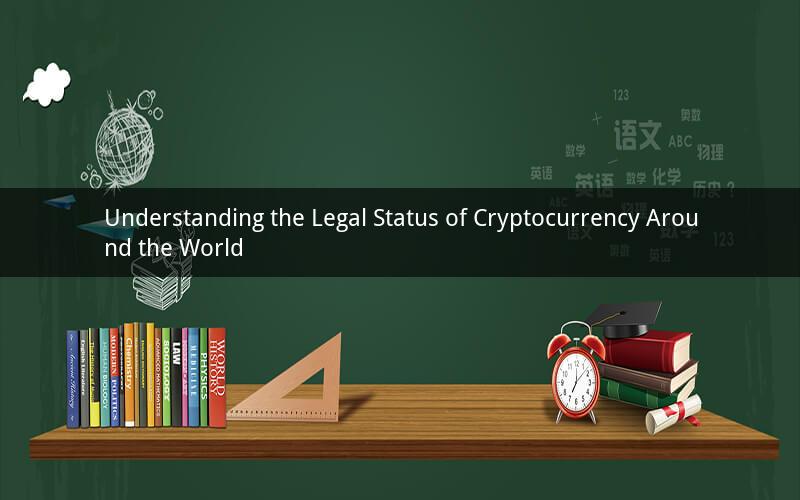
Introduction:
Cryptocurrency has gained immense popularity in recent years, with millions of individuals and businesses embracing its innovative features. However, one of the most frequently asked questions about cryptocurrency is whether it is legal. This article delves into the legal status of cryptocurrency in different regions, highlighting the varying regulations and policies that govern its use.
1. The Legal Status of Cryptocurrency in the United States
In the United States, the legal status of cryptocurrency is complex. While cryptocurrencies are not considered legal tender, they are not explicitly illegal either. The U.S. government has taken a hands-off approach, allowing individuals and businesses to use them as a medium of exchange. However, the regulatory framework surrounding cryptocurrency is still evolving, with various agencies, such as the Securities and Exchange Commission (SEC) and the Internal Revenue Service (IRS), playing a crucial role in regulating its use.
2. Cryptocurrency Regulation in Europe
Europe has been at the forefront of cryptocurrency regulation, with several countries implementing comprehensive frameworks. The European Union (EU) has proposed a regulatory framework known as the Markets in Crypto-Assets (MiCA) regulation, which aims to provide a harmonized approach to regulating cryptocurrency exchanges, wallet providers, and other crypto service providers. While MiCA is still in the proposal stage, several EU member states have already implemented their own regulations, making the legal status of cryptocurrency vary across the region.
3. Cryptocurrency Regulation in Asia
Asia has seen a mixed bag of regulations regarding cryptocurrency. Countries like Japan and South Korea have embraced cryptocurrency and have implemented regulations to ensure its legality and protect consumers. Japan, for instance, has classified cryptocurrencies as a legal payment method and has established strict regulations for crypto exchanges. On the other hand, countries like China have banned cryptocurrency mining and trading, considering it a threat to their financial stability and national security.
4. Cryptocurrency Regulation in Africa
Africa has been relatively open to cryptocurrency, with several countries legalizing its use. South Africa, for example, has recognized cryptocurrencies as a legal payment method and has implemented regulations to ensure their use is transparent and secure. However, the regulatory landscape in Africa is still evolving, with some countries yet to establish clear guidelines for the use of cryptocurrency.
5. Cryptocurrency Regulation in Latin America
Latin America has been another region where cryptocurrency has gained significant traction. Countries like Argentina and Mexico have implemented regulations to ensure the legality and security of cryptocurrency transactions. Argentina, for instance, has recognized cryptocurrencies as a legal payment method and has implemented measures to tax cryptocurrency transactions. However, the regulatory framework in Latin America is still in its infancy, with some countries yet to establish clear guidelines.
Common Questions and Answers:
1. Question: Can I use cryptocurrency to pay taxes?
Answer: The legality of using cryptocurrency to pay taxes varies by country. In some countries, such as Japan and Argentina, it is legal to use cryptocurrency to pay taxes. However, in others, like the United States, you must convert your cryptocurrency to fiat currency before paying taxes.
2. Question: Are there any legal risks associated with owning cryptocurrency?
Answer: Yes, there are legal risks associated with owning cryptocurrency. These include regulatory changes, security breaches, and potential tax implications. It is essential to stay informed about the legal status of cryptocurrency in your country and take appropriate measures to protect your assets.
3. Question: Can I use cryptocurrency to make international transactions?
Answer: Yes, you can use cryptocurrency to make international transactions. Cryptocurrency offers a faster, more cost-effective, and more secure alternative to traditional money transfer methods. However, it is crucial to ensure that the recipient country recognizes and accepts cryptocurrency as a legal payment method.
4. Question: Are there any countries that have banned cryptocurrency?
Answer: Yes, several countries have banned cryptocurrency, including China, Bolivia, and Ecuador. These countries have cited various reasons for their bans, such as concerns about financial stability, national security, and money laundering.
5. Question: How can I stay informed about the legal status of cryptocurrency in my country?
Answer: To stay informed about the legal status of cryptocurrency in your country, you can follow the following steps:
- Keep an eye on local news and regulatory updates.
- Consult with a legal professional specializing in cryptocurrency law.
- Join online forums and communities dedicated to cryptocurrency to stay updated on the latest developments.
Conclusion:
The legal status of cryptocurrency varies significantly across the globe, with some countries embracing it and others imposing strict regulations or outright bans. As the cryptocurrency market continues to grow, it is essential to stay informed about the legal landscape in your country to ensure compliance with regulations and mitigate potential risks.